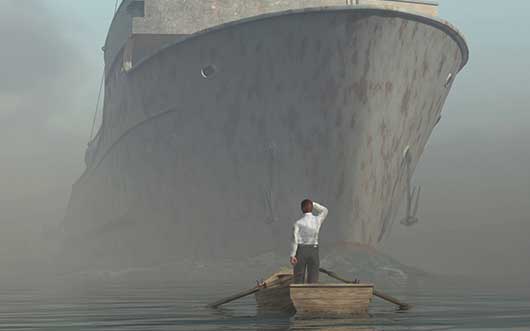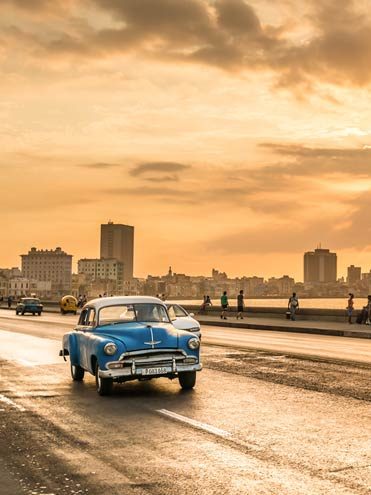
Vacations are those perfect little snapshots in time where life is supposed to be free of worry. We put down the phone, shut off the computer and are thankful life will be less harried for the next few days. Everyone, especially busy moms, needs a chance to relax, recharge and escape the stress of everyday life.
But what if our vacation brought us something a little more unexpected than the normal toes-in-the-sand, drink-in-hand bliss? What if disaster struck out of the blue? Do you know how to prepare for travel plans that go off course? It’s a topic most of us don’t give a second thought to, really. Usually, we just don’t think to prepare for a vacation gone awry.
ACCIDENTS HAPPEN
An unfortunate real-life example recently occurred on the Carnival Cruise Line’s Triumph ship. It was supposed to be a peaceful cruise on the Caribbean Sea, but the voyage turned out to be anything but—the ship ended up stuck at sea for almost a week due to an engine fire. After a long ordeal filled with power outages (no air conditioning or running water), few working toilets, a scarce amount of food and bedraggled and frustrated vacationers, Triumph was slowly towed to the shore of Mobile, Alabama.
According to Business Insider, vacationers will be able to book a trip on Triumph starting as early as April 2013. Yes, this is the same ship that just a few weeks ago passengers described as “flooded with sewer water.” So, what if you ended up on a vacation that turned out to be anything but relaxing? With a little preparation, it’s simple to have a plan in place for mild to severe travel disasters.
TRAVEL INSURANCE
Start preparing before you arrive at the airport. Travel insurance can be one of the best investments you make in yourself and your family’s precious vacation time. Begin by researching policies from travel insurance companies such as Travel Guard. Check if the booking site or travel agent recommends a specific travel insurance dedicated to the location to which you’re headed.
Keep in mind that rates for travel insurance can vary according to the total cost of your vacation as well as how much coverage you wish to purchase. There are usually very strict restrictions on what the travel insurance will and will not cover, so pay attention to the fine print. Most often, coverage includes trip interruption, trip cancellation, trip delay or missed connection, baggage delay or loss, medical expenses, involuntary job loss and war or terrorism. Cross-check insurances to see what works best for you and the type of trip you’re planning.
Read Related: How a Mom of Three Travels Alone With Her Kids
There are à la carte insurance options you can choose to add on as well, including the ability to cancel for any reason at any time, airline accident coverage, car rental collision coverage, updated medical coverage and emergency evacuation. Cruise Critic recommends you carefully read the description of coverage and call the insurer to resolve any questions you may have before you make any purchases. The best time to book travel insurance is between the time you make your initial trip deposit and 10-15 days after.
Most travel insurance will not cover weather (experiencing a week of rain will not be covered; however, a natural disaster would be), itinerary changes (travel insurance covers your trip but not changes to the itinerary, like skipping a port) and frequent flier award tickets. This last one is a big one: Airline tickets purchased with frequent flier miles aren’t covered. However, insurers will reimburse the redeposit fee if you cancel the award before embarking on the first leg of the flight, or it will cover the change fee if you must reschedule your return ticket due to a covered event.
GOVERNMENT HELP
The U.S. Department of State recommends travelers sign up for its free Smart Traveler Enrollment Program before embarking on a trip. If there’s a family emergency at home or a crisis where you are traveling, a government agent would be able to contact you. Also, leave copies of your itinerary and passport information with those you trust at home. Familiarize yourself with local conditions, weather, laws and customs where you are traveling.
While traveling, make sure to carry your signed passport with emergency contact information fully filled out. Take precautions to avoid being a target of a crime, too; don’t wear conspicuous clothing or jewelry, don’t carry excessive amounts of money and don’t leave luggage unattended or accept packages from strangers. It’s always a good idea to know how to defend yourself, at home or abroad.
Finally, if something does go wrong, maintain a positive attitude. This may be the hardest thing of all, but if you can’t change what’s happening, you can control your reaction to it. Stressing out and getting upset won’t make it better any faster. Be happy knowing you’ve done all you can to prepare for the worst. And if nothing else, you’ll have an interesting story to share once the dust settles.












